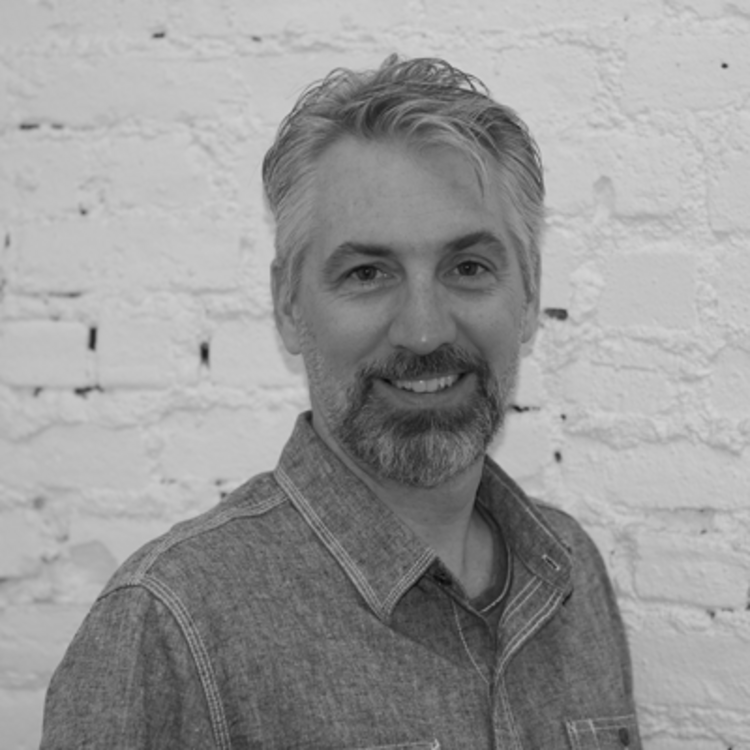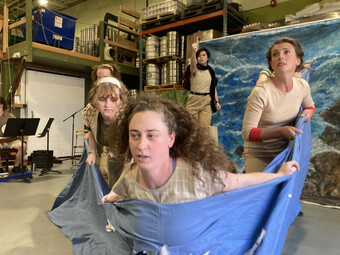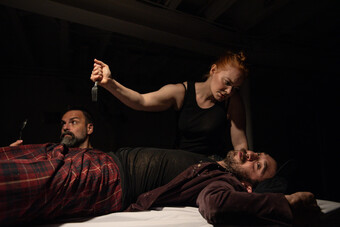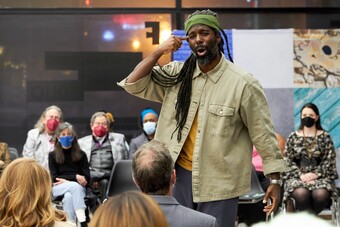Men of Grosser Blood
Shakespeare Through the Lens of a Military Veteran
This ten-part series examines Shakespeare from a military veteran's perspective and offers a new angle on Shakespeare's text and characters, while delving deep into the challenges facing American theater and society.
The bullet ripped past me. It was my first time. And it was real. Here was my chance. I had trained, endlessly, day in and day out for months and months. Even in my "off" time, I trained, I rehearsed. I was convinced that my first time in a firefight I would be one part Rambo and one part John Wayne: firing from the hip in rage, yet giving concise brilliant orders to my men in a manly voice, in a heroic pose with bullets passing all around me. But, the truth is, in that fraction of a second when the unmistakable air-ripping, shock wave of a bullet ripped past my head I ducked behind a tree and I desperately tried to become part of the ground and tree—willing the earth to absorb me, like the tiny sea creatures on the ocean floor who bury themselves when a predator passes. But the earth and the tree weren't cooperating. I looked at my men, their eyes wide, searching for the answer in me, waiting for me to do something, to say something... "Oh s*#t!" I suddenly remembered that I am in charge. If I don't do something they will die!
In the heat of battle, in spite of all my training, I flinched.
Rereading Shakespeare's Henry V, especially the first scene of act three where Henry V addresses his cowering men, I was reminded of this moment on the battlefield. In the heat of combat, in the middle of attacking the castle of Harfleur, his men retreat to the safety of a trench. Henry V's men, like me, had succumbed to that ancient human reflex of survival. If Henry is to win the battle he must force his conscripts (who we would call "draftees") out of the trench and back into the fight. But how? What will make a person ignore that autonomic survival impulse and, instead, run toward danger?
Henry V using the oldest most effective theme conducts a spontaneous basic training. He tells them:
Once more unto the breach, dear friends, once more;
Or close the wall up with our English dead. (3.1)
When is it acceptable to be less human and more animal-like:
In peace there's nothing so becomes a man
As modest stillness and humility,
But when the blast of war blows in our ears
Then imitate the action of the tiger;
Stiffen the sinews, summon up the blood
How to make a face fit for war:
Disguise fair nature with hard-favour'd rage;
Then lend the eye a terrible aspect;
Let pry through the portage of the head
Like the brass cannon; let the brow o'erwhelm it
As fearfully as doth a galled rock
O'erhang and jutty his confounded base
Swilled with the wild and wasteful ocean.
Now set the teeth, and stretch the nostril wide
How to prepare to charge into a fight:
Hold hard the breath and bend up every spirit
To his full height. On, on you noblest English.
How to honor their family name and earn honor:
Dishonour not your mothers; now attest
That those whom you call'd fathers did beget you.
How to be the model warrior:
Be copy now to men of grosser blood,
And teach them how to war!
How to prove their "manhood" and their patriotism.(Or as cadre would yell into the bullhorn during bayonet training, "There are two types of soldiers, the quick and the dead! Which are you?")
And you, good Yeoman,
Whose limbs were made in England, show us here
The mettle of your pasture; let us swear
that you are worth your breeding; which I doubt not...
Henry V finally, convinces them that they're prepared, and gives his men a physical outlet for their emotions by asking them to charge at the enemy:
I see you stand like greyhounds in the slips,
Straining upon the start. The game's afoot:
Follow your spirit, and upon this charge
Cry ‘God for Harry, England, and Saint George!'
Meanwhile, back to me who, more like Bardolph than Henry V, lies crouching behind a tree in my first firefight. So what, you ask, was my inspiring speech to my men? Without thought I yelled:
"Shoot back!" (I was far less eloquent than Shakespeare)"Return fire! Alpha team on-line, lay down suppressing fire! M-60 here, on me! Bravo team flank right, kill those f#%*-ers!"
But after we charge and are face to face with another person, with the "enemy," will we kill them? Contrary to popular opinion, we are not wired to kill each other. In fact, according to Lieutenant Colonel Dave Grossman in his book, On Killing: The Psychological Cost of Learning to Kill in War and Society, an average 15 to 20 percent of individual rifleman actually shoot to kill.
So what does make us kill? What was Henry V's theme? And why did my men attack? Camaraderie. Camaraderie built under life and death circumstances is what makes us fight and will make us kill. Here is Grossman on why a soldier may kill:
A tremendous volume of research indicates that the primary factor that motivates a soldier to do the things that no sane man wants to do in combat (that is, killing and dying) is not the force of self-preservation but a powerful sense of accountability to his comrades on the battlefield.
Camaraderie, as seen in the oft quoted "Crispin's Day" speech of Henry V:
We few, we happy few, we band of brothers.
For he today that sheds his blood with me
Shall be my brother... (4.3)
Camaraderie: Of Henry V's wars in France during the early 1400s, of England's veterans from their wars with Spain and Ireland in the late 1500s while Shakespeare was writing his plays, of the 1980s and 90s when I served, and of the veterans of OIF/OEF (Operation Iraqi Freedom/Operation Enduring Freedom) today—throughout time it's true that:
Four brave men who do not know each other will not dare to attack a lion. Four less brave, but knowing each other well, sure of their reliability and consequently of mutual aid, will attack resolutely. There is the science of the organization of armies in a nutshell. (Ardant Du Picq, Battle Studies)
But eventually, the training and wars end. And camaraderie gives way to "going home."
This, to me, is our national crisis. We as a nation, much like Shakespeare's plays, are brilliant at using camaraderie to: define masculinity, create and dehumanize an enemy, and to motivate our men and women towards violence. But after the “blast of war blows” in their ears, where is the blueprint for what to do after killing? Where are the speeches post-combat that teach men and women how to reconnect with their humanity? Where is the camaraderie and training to leave the “stiffened sinews” of combat training behind and learn how to regain the “modest stillness and humility” of peacetime? Why isn't there an equal amount of time and energy in creating camaraderie as a tool to heal after war?
Thus far with rough and all-unable pen
Our bending author hath pursued the story.
[Henry V, Epilogue]
More anon.











Comments
The article is just the start of the conversation—we want to know what you think about this subject, too! HowlRound is a space for knowledge-sharing, and we welcome spirited, thoughtful, and on-topic dialogue. Find our full comments policy here
What a great blog Stephan. Thank you for sharing those personal insights. :)
Veterans, PTSD, Theater and Shakespeare. It all makes sense yet as your essays probe deeper I continue to gain a better understanding and appreciation for your work, your passion. Thanks Stephan.
You got me. I'm awaiting your next installment.
A trip to Israel was eye-opening. The military is a shared experience, across the board. Every citizen, except for a particular religious sect, is required to serve two years in uniform. While in service, they are not just schooled in combat, but also in science, social studies, history and the arts. Plus there are civilian security personnel patrolling public spaces. They are not "outsiders" or "the other". They are all fellow citizens, with no lines drawn between them and the general population. National security and military readiness is a daily fact of life. It wouldn't be practical here, maybe, but they do not seem to experience the post-service issues that occur in this country. And I have long understood, through your writings, that the power of theater is the answer. Thank you for these inspiring essays, Stephan.
Comraderie is a great provocation, Stephan-- does it not point to a role here for those of us who have not heard the blast of war or the air-ripping sound of a bullet in battle? If our men and women are to come home and find Comraderie we who stayed need tools as well. Empathy, patience, a sense of ease with the gulf between our two experiences. We seem to be failing on all sides here. Throughout the millennia haven't there always been homecoming rituals to mark that transition to the modest stillness and humility? For my generation, the first homecoming was Vietnam-- a terrible lesson on this front, but all the instruction I was given.
Thank you for sharing this series with us.
fascinating thoughts! My joy in working on, and translating, Brecht's huge fragment "Fatzer", stemmed from his investigation of what happens when the one who leads in battle, becomes counterproductive in the time after the war is over. "I can no longer do, what is good for me and destiny.." I look forward to reading more about this!
What an important question you ask! And Shakespeare's heroic/poetic take on war is reinforced thru America's foolish belief that we can redeem ourselves through acts of violence. Almost everything in our culture points us that way - our movies, our novels, our plays, even our constitution suggests that the health of the nation is dependant on armed & trained citizens, ready to kill. Richard Slotkin speaks so eloquently of all of this in "Regeneration Through Violence" but no one is answering this crucial question - how do we come down from that violence - how do we come home from the war? I cannot wait to read your thoughts...
Where indeed? Anyone who has seen your work uniting veterans and their communities thru Shakespeare knows the transformative healing power of theater is an answer.